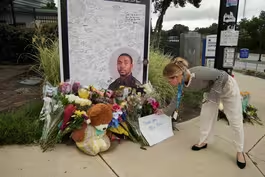
State Department drops criticism of Israel and El Salvador
Clip: 8/12/2025 | 6m 22sVideo has Closed Captions
State Department drops criticism of Israel and El Salvador in human rights report
The State Department released its annual human rights report Tuesday, but unlike in years past, this edition has come under scrutiny for omitting issues and countries with poor human rights records. Nick Schifrin looks at the report and at this active week of renewed Trump diplomacy with Russia.
Problems playing video? | Closed Captioning Feedback
Problems playing video? | Closed Captioning Feedback
Major corporate funding for the PBS News Hour is provided by BDO, BNSF, Consumer Cellular, American Cruise Lines, and Raymond James. Funding for the PBS NewsHour Weekend is provided by...

State Department drops criticism of Israel and El Salvador
Clip: 8/12/2025 | 6m 22sVideo has Closed Captions
The State Department released its annual human rights report Tuesday, but unlike in years past, this edition has come under scrutiny for omitting issues and countries with poor human rights records. Nick Schifrin looks at the report and at this active week of renewed Trump diplomacy with Russia.
Problems playing video? | Closed Captioning Feedback
How to Watch PBS News Hour
PBS News Hour is available to stream on pbs.org and the free PBS App, available on iPhone, Apple TV, Android TV, Android smartphones, Amazon Fire TV, Amazon Fire Tablet, Roku, Samsung Smart TV, and Vizio.
Providing Support for PBS.org
Learn Moreabout PBS online sponsorshipAMNA NAWAZ: The State Department released its annual human rights report today, but, unlike years past, this edition has come under scrutiny for what it's not reporting about many issues and countries with poor human rights records.
Nick Schifrin is here now to discuss the report and to look forward to this active week of renewed Trump diplomacy with Russia.
Good to see you, Nick.
NICK SCHIFRIN: Thanks, Amna.
AMNA NAWAZ: Let's talk about this report.
What is different in this year's report from years past?
NICK SCHIFRIN: The report removes stand-alone sections on women's rights, LGBTQ rights, and discrimination on racial or ethnic lines.
It strengthens criticisms of countries that Trump and his administration have clashed with diplomatically and weakens criticism of some of the administration's allies.
So let's take one example, El Salvador, which, of course, as you know well, is the strongest regional immigration partner for the United States.
Last year's report, the last one written by the Biden administration, reads in part -- quote -- "Significant human rights issues included credible reports of unlawful or arbitrary killings and forced disappearance, torture or cruel and human or degrading treatment or punishment by security forces, harsh and life-threatening prison conditions, arbitrary arrest and detention."
That paragraph actually goes on for double that length in the last Biden administration report.
It has been replaced by this sentence: "There were no credible reports of significant human rights abuses" -- quote, unquote.
So that's the kind of change that you see.
Today, Tammy Bruce, the State Department spokeswoman, was asked specifically about the El Salvador report.
She didn't engage with the text, but said this about the administration's approach: TAMMY BRUCE, State Department Spokesperson: Each administration, like with President Trump, reflects a value system and an agenda and a vision that convinced the American people to vote for them.
It needed to change, based on the point of view and the vision of the Trump administration.
It certainly promotes, as does our work, a respect for human rights around the globe.
NICK SCHIFRIN: Another example, Amna, Israel.
The Biden administration's last report was more than 100 pages.
This is less than a fifth of that.
It removes most of or almost all of the criticisms of the Israeli government.
But on the other hand, this year's report increases criticisms of South Africa, which, of course, the Trump administration has clashed with diplomatically, and increases criticisms of Brazil for targeting Jair Bolsonaro, the former president who, of course, tried to launch a coup against the current government more than two years ago.
AMNA NAWAZ: Some dramatic changes there.
So when you talk to folks in the human rights community, what are they saying about this report?
NICK SCHIFRIN: Historically, this report has been very important for the community and also for individual human rights advocates around the world, because it's appeared in war crimes cases.
It appears in individual asylum cases.
It appears in academic research.
But parts of this year's report do not match that historic credibility and accuracy, argues the deputy director of Human Rights Watch's Washington office, Nicole Widdersheim.
NICOLE WIDDERSHEIM, Deputy Washington Director, Human Rights Watch: We feel like this has been the politicization of a very credible, useful human rights tool that really lent credibility to the whole entire exercise of the State Department for the last couple decades.
NICK SCHIFRIN: Widdersheim says the report is accurate on some countries, places like Afghanistan and Haiti.
But those countries are the very places that the Department of Homeland Security has removed protections for refugees living in the United States.
NICOLE WIDDERSHEIM: And they document terrible things that are happening right now in Afghanistan, particularly to women and children, the same with Sudan, same with South Sudan, relatively accurate read on Ethiopia, Haiti.
And yet, at the same time, they're canceling protection for Afghans, for Haitians, for Venezuelans, for Nicaraguans.
And they're sending people back to these countries to be victims and sending them back into peril.
NICK SCHIFRIN: State Department spokesman Tammy Bruce said today the new report removes -- quote -- "politically biased demands and assertions."
AMNA NAWAZ: Meanwhile, Nick, I know you're also reporting on the war in Ukraine, this upcoming summit.
What are you hearing from European leaders and from the White House about what to expect from this Friday summit between President Trump and Russian President Vladimir Putin?
NICK SCHIFRIN: The Ukrainians and the Europeans are especially worried that President Trump could make a deal about Ukraine without Ukraine in the room directly with Russian President Vladimir Putin.
Today, Zelenskyy said that Putin wants Ukraine to withdraw from all of Donetsk, all of Eastern Ukraine, including parts that Ukraine still controls and that Russia doesn't occupy.
He rejected that and said today that Ukrainians would reject any deal made directly and only between President Trump and President Putin.
VOLODYMYR ZELENSKYY, Ukrainian President (through translator): It is impossible to talk about Ukraine without Ukraine, and no one will accept that.
So the conversation between Putin and Trump may be important for their bilateral track, but they cannot agree on anything about Ukraine without us.
I truly believe and hope that the U.S. president understands and realizes that.
NICK SCHIFRIN: Today, the White House downplayed expectations, calling Friday's summit -- quote -- "a listening exercise" for President Trump, emphasizing that it was President Putin who actually requested it.
Putin has talked and his allies have talked about normalizing relations with the United States, going beyond Ukraine, talking about things like nuclear stability, possible economic deals, direct flights, but, today, White House spokesperson Karoline Leavitt rejected that.
QUESTION: Is President Trump open to those kind of peripheral conversations or is this directly focused on ending the war in Ukraine?
KAROLINE LEAVITT, White House Press Secretary: I think this conversation on Friday is focused on ending the war in Ukraine, as far as the president's perspective goes.
Those conversations, I think the president is interested in having, but his main priority right now is ending this war and to stop the killing that has gone on for far too long.
NICK SCHIFRIN: And the war does go on, Ukraine struggling to hold the line.
This video released by the Russian Ministry of Defense just today shows Russian soldiers raising Russian flags in the eastern province of Donetsk.
Amna, the timing for Ukraine could not be worse.
It could allow Putin to paint Ukraine in dire straits during that summit.
AMNA NAWAZ: A lot is happening on that front.
I know you're going to continue to cover it all.
Nick Schifrin, thanks, as always.
NICK SCHIFRIN: Thank you.
CDC shooting highlights hostility against health workers
Video has Closed Captions
Clip: 8/12/2025 | 8m 2s | CDC shooting highlights increasing rhetoric and hostility against health professionals (8m 2s)
How to beat AI-driven custom pricing
Video has Closed Captions
Clip: 8/12/2025 | 4m 39s | How to beat AI-driven custom pricing (4m 39s)
Maine residency gives Black and Brown artists a platform
Video has Closed Captions
Clip: 8/12/2025 | 7m 52s | Maine arts residency gives Black and Brown artists a platform to develop their craft (7m 52s)
News Wrap: National Guard soldiers arrive on streets of D.C.
Video has Closed Captions
Clip: 8/12/2025 | 6m 52s | News Wrap: National Guard soldiers arrive on streets of Washington, D.C. (6m 52s)
Sudan's famine worsens as civil war intensifies
Video has Closed Captions
Clip: 8/12/2025 | 5m 33s | Sudan's famine worsens as civil war intensifies: 'We have nothing to eat but animal feed' (5m 33s)
Tariff-driven inflation accelerating, AEI's Strain says
Video has Closed Captions
Clip: 8/12/2025 | 6m 7s | Tariff-driven inflation accelerating with 'worst yet to come,' AEI's Michael Strain says (6m 7s)
Providing Support for PBS.org
Learn Moreabout PBS online sponsorshipSupport for PBS provided by:
Major corporate funding for the PBS News Hour is provided by BDO, BNSF, Consumer Cellular, American Cruise Lines, and Raymond James. Funding for the PBS NewsHour Weekend is provided by...

















